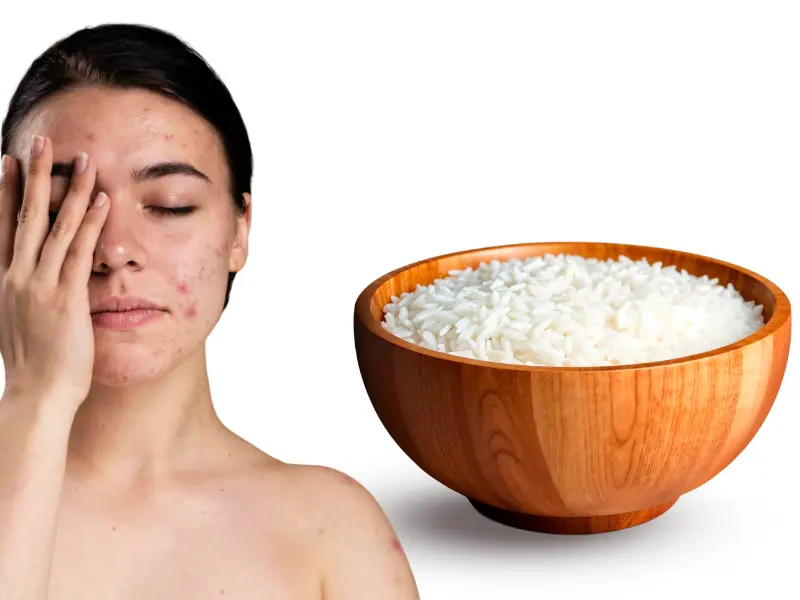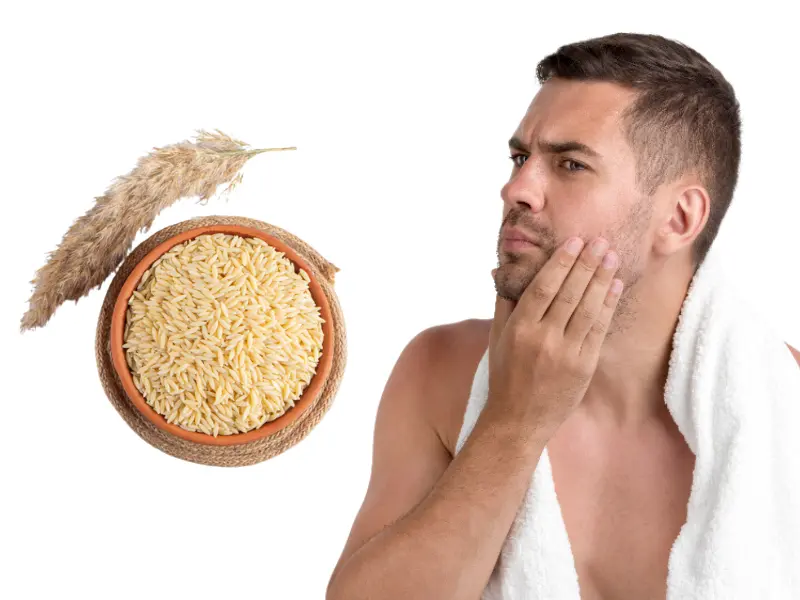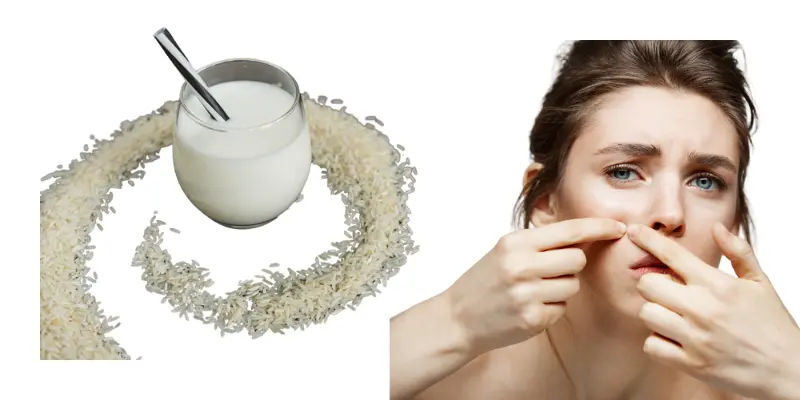Does Rice Cause Acne?
Published: 23 Mar 2025
Certain foods, especially those with a high glycemic index, are believed to trigger breakouts. Rice, a staple food for billions worldwide, often comes under scrutiny. Some claim it worsens acne, while others argue that certain types of rice may benefit the skin.
So, what’s the truth? Does rice cause acne, or is it just another diet myth? In this article, we’ll explore how different types of rice impact skin health, whether white rice is an acne culprit, and whether brown rice or rice water might be beneficial. Let’s see!
1- Rice and Acne: What’s the Connection?
Many people also relate acne to other foods, such as mangoes, bananas, spicy meals, almond milk, eggs, dairy, junk food or even peanut butter.
Let’s see whether the rice is the acne trigger or if it is only a myth.
1.1 How Blood Sugar Spikes Secretly Cause Your Acne
The glycemic index (GI) measures how quickly a food raises your blood sugar levels. High-GI foods cause rapid spikes in your blood sugar, leading to a surge in insulin levels.
This increase in insulin can trigger excess sebum (oil) production in your body, which clogs pores and contributes to acne. (1)
1.1.1 Is Your Love for White Rice Causing Breakouts?
White rice has a high GI, which can lead to blood sugar spikes and increase the risk of breakouts.
Frequent consumption of high-GI foods may contribute to hormonal imbalances, inflammation, and excessive oil production, which are the key factors in acne development.
Wondering how brown rice could actually heal your acne? Keep reading!

1.1.2 Brown Rice for Acne: Friend or Foe?
Unlike white rice, brown rice has a lower GI, which does not cause sudden blood sugar spikes. Here’s why brown rice might be beneficial for acne-prone skin:

- Rich in fibre – Slows down sugar absorption, preventing insulin spikes.
- Packed with antioxidants – Helps reduce inflammation, a key factor in acne.
- Contains essential nutrients – Zinc, selenium, and B vitamins support skin healing and repair. (2)
Since brown rice doesn’t trigger sharp insulin fluctuations in your body, it’s less likely to contribute to acne compared to white rice. Instead, it may help stabilize blood sugar and reduce the risk of breakouts.
1.1.3 Does Rice Trigger Inflammation and Acne?
Rice itself is not inherently inflammatory, but the way it affects the body depends on its processing and how often it’s consumed.
White rice, when eaten frequently, may promote low-grade inflammation due to its high GI, while brown and wild rice have anti-inflammatory properties that may actually support skin health.
Don’t worry. Not everyone will experience acne from eating rice, but certain individuals may be more susceptible due to how their bodies process carbohydrates.
1.3.1 People with Insulin Resistance or PCOS
- If you are insulin resistant your body will produce higher insulin levels, which leads to excess sebum production contributing to acne.
- Women with PCOS (Polycystic Ovary Syndrome) often experience hormonal imbalances that make them more prone to acne, especially when consuming high-GI foods like white rice.
1.3.2 Those with a High-Carb, Low-Protein Diet
- A diet high in refined carbs and low in protein and healthy fats can cause frequent blood sugar spikes, increasing inflammation and acne breakouts.
1.3.3 Individuals Sensitive to Blood Sugar Fluctuations
- Some people have a stronger insulin response to high-GI foods, making them more likely to experience breakouts after consuming white rice.
If you notice acne flare-ups after eating rice, switching to brown rice or pairing it with fibre and protein may help stabilize your blood sugar levels.
Need quick tips to enjoy rice without risking breakouts? Don’t miss this
| 1.4 How to Eat Rice Without Worsening Acne |
|---|
While rice doesn’t directly cause acne for everyone, the way you consume it matters. Here are some tips to enjoy rice without triggering breakouts: ✔ Choose Low-GI Rice:Opt for brown rice, basmati rice, or wild rice instead of high-GI white rice. These options have a slower impact on blood sugar levels. ✔ Balance Your Meals:Combine rice with lean protein, healthy fats, and fibre (e.g., vegetables, chicken, fish, or legumes). This slows down glucose absorption and prevents insulin spikes.  ✔ Watch Your Portions:Overeating rice—especially refined white rice—can contribute to blood sugar fluctuations, which may trigger acne. Stick to moderate servings to maintain balance. ✔ Stay Hydrated:Drinking enough water helps flush out toxins and supports clear skin. ✔ Follow an Overall Skin-Friendly Diet:Reduce processed foods, sugary snacks, and dairy, which may worsen acne. Instead, focus on whole, nutrient-rich foods like fruits, vegetables, and omega-3-rich sources. |
Still wondering if your favourite foods are messing with your skin? Dive deeper with our latest skin-friendly diet tips; your future clear skin will thank you!
How switching to healthier rice options may improve skin?
- Switching to healthier rice options like brown rice, basmati rice, or wild rice can help improve skin by reducing blood sugar spikes, which lowers insulin-related acne flare-ups.
- Brown rice, in particular, is rich in fibre, antioxidants, and vitamins B & E, which support skin repair, reduce inflammation, and promote a clearer complexion.
- Choosing these options over white rice may help balance hormones, reduce breakouts, and support overall skin health.
Ever tried rice water for skin care? Here’s what you should know before you do
1.5 Rice Water for Acne: Miracle or Myth?
Rice water is the starchy liquid left behind after soaking or boiling rice. It has been used in skincare for centuries, particularly in Asian beauty routines.

- Rich in Nutrients: Rice water contains amino acids, vitamins B and E, and minerals, which may support skin healing and repair.
- Soothes Irritation: Its anti-inflammatory properties can help reduce redness and irritation associated with acne.
- May Lighten Acne Scars: Some people use rice water to fade acne scars and improve overall skin tone.
6 Conclusion
So guys, in this article, we’ve covered “Does rice cause acne?” in detail. The impact of rice on acne varies from person to person, but if you suspect it’s a trigger for you, try reducing your intake of white rice and replacing it with brown rice or wild rice for a few weeks. Pay attention to how your skin reacts and adjust accordingly.
My personal recommendation? Moderation is key! Don’t stress over a single food—focus on an overall balanced, nutrient-rich diet. Have you ever tried tweaking your diet for better skin? Share your experience in the comments!
Found this helpful? Share it with your friends
7- FAQs
Yes, white rice has a high glycemic index (GI), which can cause blood sugar spikes and increase oil production. Brown rice, on the other hand, has more fibre and a lower GI, making it less likely to trigger breakouts. Choosing whole-grain rice may help in managing acne.
Not necessarily! Rice itself isn’t harmful to the skin, but refined white rice can contribute to inflammation and acne in some people. It’s all about balance—pairing rice with protein, healthy fats, and fiber can help maintain clear skin.
Yes, brown rice is rich in fibre, antioxidants, and essential vitamins like B and E, which support skin health. It helps regulate blood sugar, reducing the chances of insulin spikes that can lead to acne. Plus, its anti-inflammatory properties may soothe the skin.
Not necessarily! Instead of cutting out rice completely, try switching to brown rice, wild rice, or basmati rice and balancing it with nutrient-dense foods. The key is moderation and ensuring a well-rounded diet.
Rice milk is highly processed and often contains added sugars, which can cause blood sugar spikes and worsen acne. If you have acne-prone skin, unsweetened almond or oat milk may be a better alternative. Always check labels for added sugars and preservatives.
Brown rice, wild rice, and basmati rice are better choices because they have a lower glycemic impact. These types help stabilize blood sugar levels, reducing the risk of hormonal fluctuations that may trigger breakouts. Whole grains are always a smarter option for skin health.
Eating rice in moderation is key—about one serving (half a cup) per meal is usually fine when paired with protein and fiber. The goal is to avoid large portions of refined carbs that can spike insulin levels. Always balance rice with vegetables, healthy fats, and lean protein.
If eaten in excess, high-GI rice (like white rice) can lead to insulin spikes, which may contribute to cystic acne in some people. Those with insulin resistance or hormonal imbalances may be more prone to breakouts from refined carbs. Switching to whole grains and maintaining a balanced diet can help.
Yes! Quinoa, cauliflower rice, barley, and whole oats are great substitutes that provide fiber and nutrients without spiking blood sugar. These alternatives can help reduce inflammation and support overall skin health.
It depends on the individual, but most people notice improvements within 2 to 4 weeks after adjusting their diet. The key is consistency—eating a balanced diet, staying hydrated, and maintaining a good skincare routine all contribute to clearer skin.
References for Further Readings
At MedicaWire, all medically sensitive content is reviewed by licensed healthcare professionals. Our team ensures that the information you read is accurate, up-to-date, and based on trusted medical sources.
Learn how we maintain high standards by reading our Editorial Policy.
📚 Sources
- Can the Right Diet Get Rid of Acne?
This article by the American Academy of Dermatology discusses how high-glycemic foods, such as white rice, can exacerbate acne and suggests that a low-glycemic diet may help reduce breakouts.
American Academy of Dentistry - Significance of Diet in Treated and Untreated Acne Vulgaris
Published in the Dermatology Journal, this study presents evidence linking high-glycemic-load diets to increased acne severity, emphasizing the potential impact of dietary choices on skin health.
pmc.ncbi.nlm.nih.gov - Association Between Diet and Acne Severity
This research article explores how the consumption of high-glycemic foods, including white rice, may worsen acne severity, highlighting the importance of dietary modifications.
medicaljournalssweden.se - Anti-Acne Diet: What to Eat for Clearer Skin and Fewer Pimples
Medical News Today discusses how certain foods, including wild rice, may help improve acne, and emphasizes the role of a balanced diet in maintaining skin health.
medicalnewstoday.com - Does Rice Cause Acne? (Hint: It Depends)
This article explores the differing impacts of white and brown rice on acne, highlighting how the glycemic index of these foods can affect skin health.
exposedskincare.com - What Foods to Eat if You Have Acne
Midland Skin Clinic discusses how avoiding high-glycemic-index foods like white rice and opting for whole grains may benefit individuals with acne.
Midland Skin
ℹ️ Our Promise
MedicaWire follows strict sourcing guidelines and only references peer-reviewed studies, academic institutions, and reputable medical associations. We update content regularly to reflect new health information.

- Be Respectful
- Stay Relevant
- Stay Positive
- True Feedback
- Encourage Discussion
- Avoid Spamming
- No Fake News
- Don't Copy-Paste
- No Personal Attacks



- Be Respectful
- Stay Relevant
- Stay Positive
- True Feedback
- Encourage Discussion
- Avoid Spamming
- No Fake News
- Don't Copy-Paste
- No Personal Attacks




